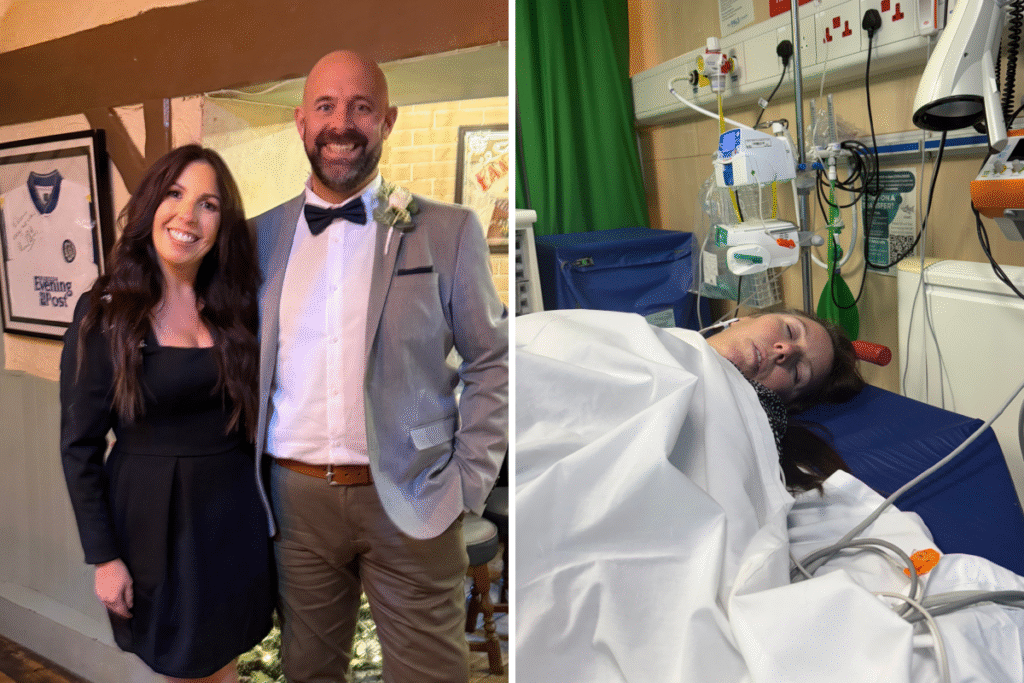When Laura Critchley struggled to speak during a work meeting, she was told to go home. But once she got into her car, she couldn’t remember how to start it.
The 40-year-old mom told Newsweek: “Initially, I thought I was having a panic attack as I was hosting the meeting. I could read the words on the screen but couldn’t say them.
“Then, I got into my car, and I knew something wasn’t right with my head.”
A Rapid Decline
Critchley’s sudden amnesia worsened as she was taken to her mother’s house in Yorkshire, England, and an ambulance was called. Medics suspected a stroke, but two CT (computerized tomography) scans revealed eight tumors in her brain, one of which was bleeding—explaining why she deteriorated so quickly.
Her partner, Lee Vaughan, 50, told Newsweek: “Laura went from bad to worse during the ambulance ride and by the time we were at the hospital she couldn’t form a sentence. It was frightening.”
Critchley was given steroids during her five-day stay in hospital, which stabilized her condition.
The Scale of the Problem
According to the Brain Tumour Charity, around 13,000 people are diagnosed with a primary brain tumor in the U.K. each year, including 900 children and young people—equivalent to 35 new diagnoses every day.
The National Brain Tumor Society states there are over 100 distinct types of primary brain tumors, each varying in presentation, treatment, and prognosis. Approximately 72 percent of all brain tumors are benign and 28 percent are malignant. An estimated 1 million Americans are currently living with a primary brain tumor.
‘Prepare for the Worst’
But Critchley’s nightmare didn’t end there. Vaughan explained: “A doctor told me to prepare for the worst, and he said it’s looking like stage 3 secondary brain cancer.”
Critchley told Newsweek she waited two weeks for an official diagnosis.
Holding back tears, she said: “It was mental torture. My main concern was leaving my boys, Brody, 10, and Frazer, eight.
I was grieving the life I was going to leave behind. It was so overwhelming and very heavy to hold. I felt so helpless.”
Relief—But Still No Answers
Sixteen days after falling ill at work on May 13, Critchley had a hospital appointment and learned that it isn’t cancer.
Vaughan told Newsweek: “We were elated but at the minute no closer to diagnosis.”
All but one of Critchley’s tumors are located at the back on the left side of her brain. They are scheduled to be removed on November 19.
One tumor is centrally located in the middle of her lobes. Vaughan said: “The doctor is going to remove the tumors and carry out pathology to understand what is causing them. They said it will be easier to treat one.”
Critchley is currently taking seizure medication after suffering one when she was admitted to hospital.
She told Newsweek: “I’m not 100 percent back to myself, still struggling with words. As the day goes on, I struggle with sentence formation.
“I am clumsy and my coordination is off. By 2 p.m., I am ready for bed.”
Missed Warning Signs
Looking back, the couple realized Critchley had been suffering from headaches for about a month before she was hospitalized. She brushed them off, assuming they were caused by using a laptop daily for work. She also recalled having a severe hangover after just two glasses of wine—something that doesn’t usually happen.
Critchley told Newsweek: “As a society we put up with stuff and tolerate things. When you have a career and you’re a mom, you have no time to be ill.”
As she awaits surgery, Critchley remains focused on recovery and being present for her children. Despite the uncertainty surrounding her diagnosis, she and Vaughan are clinging to hope that the upcoming procedure will bring clarity and a path forward.
Her experience serves as a reminder of how easily health symptoms can be overlooked—and how quickly life can change in an instant.
Read the full article here

